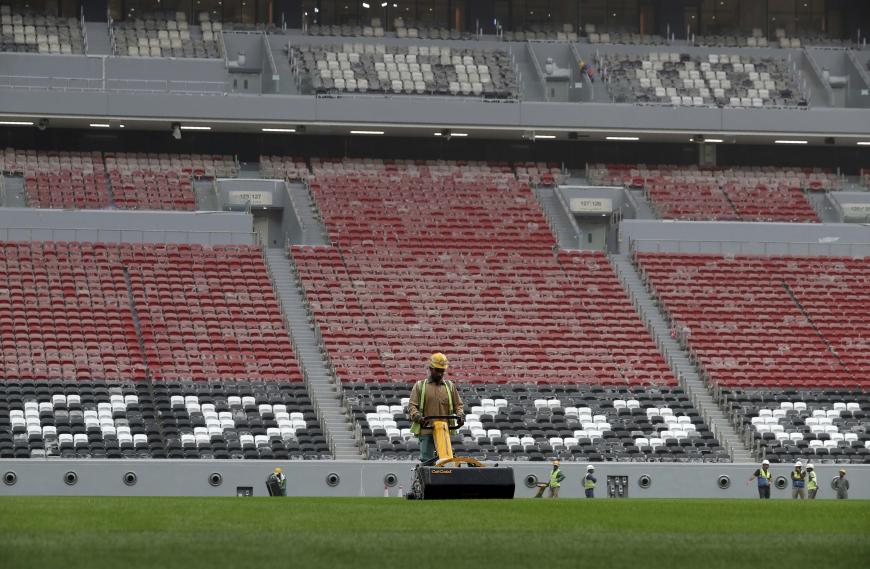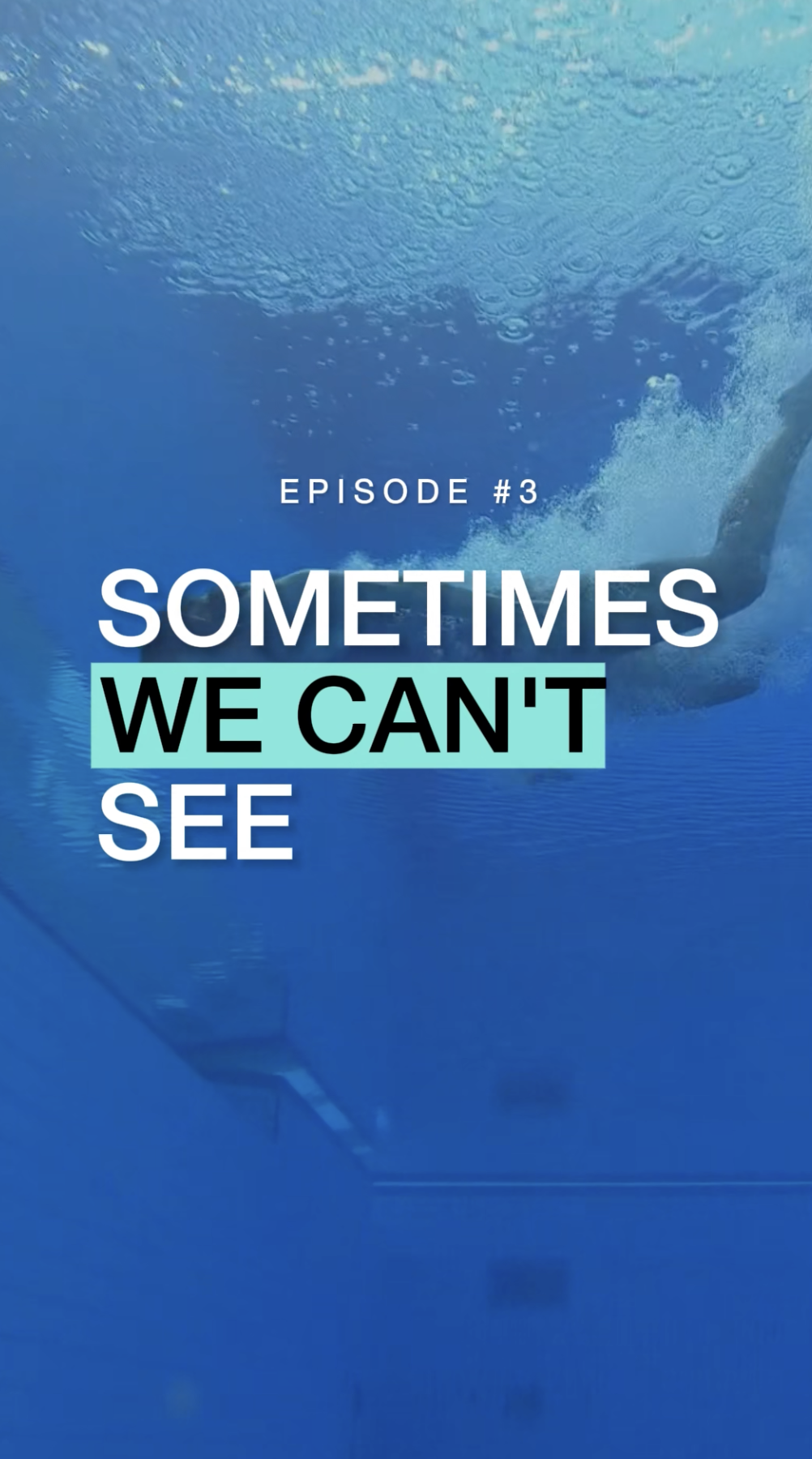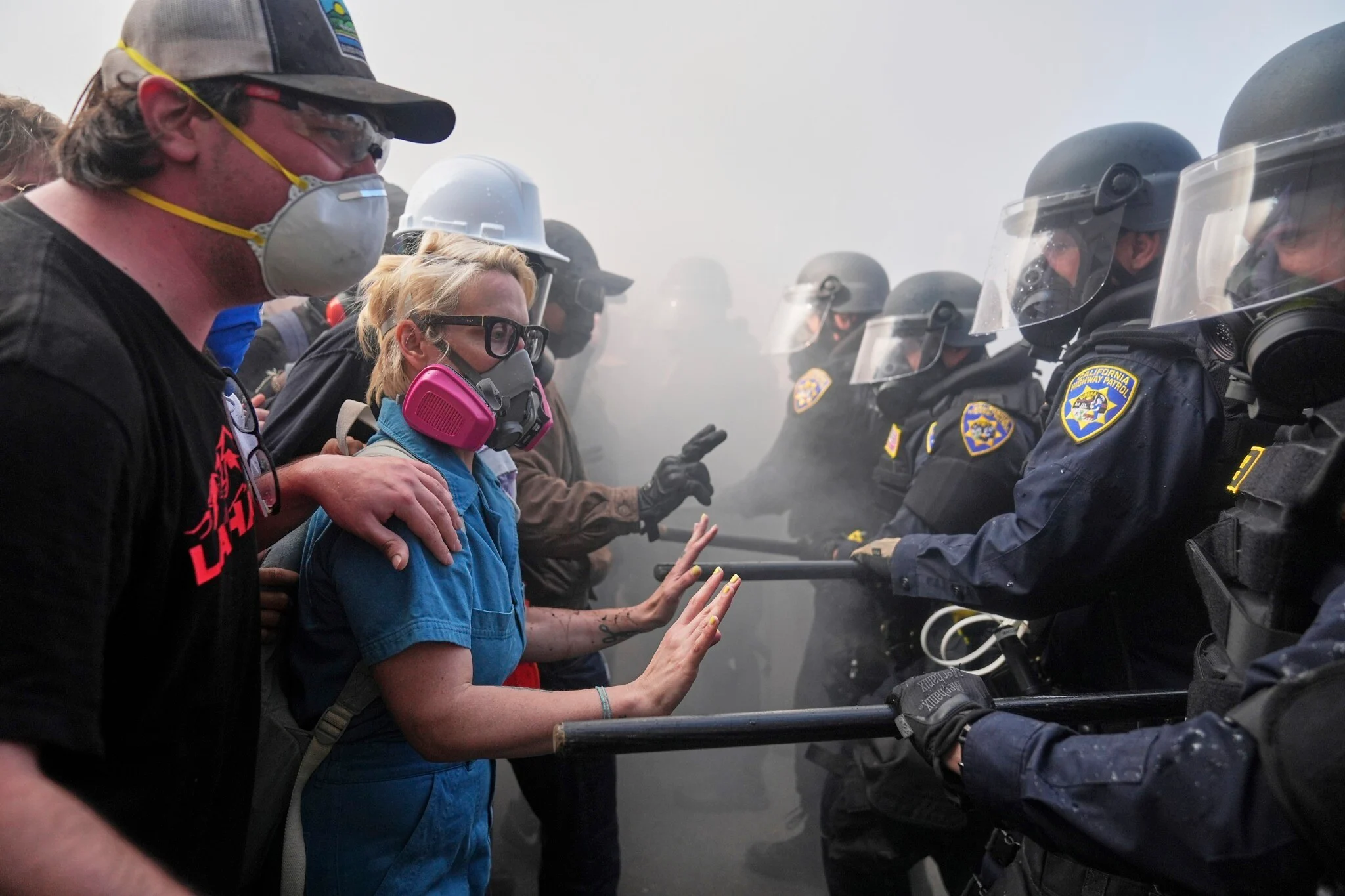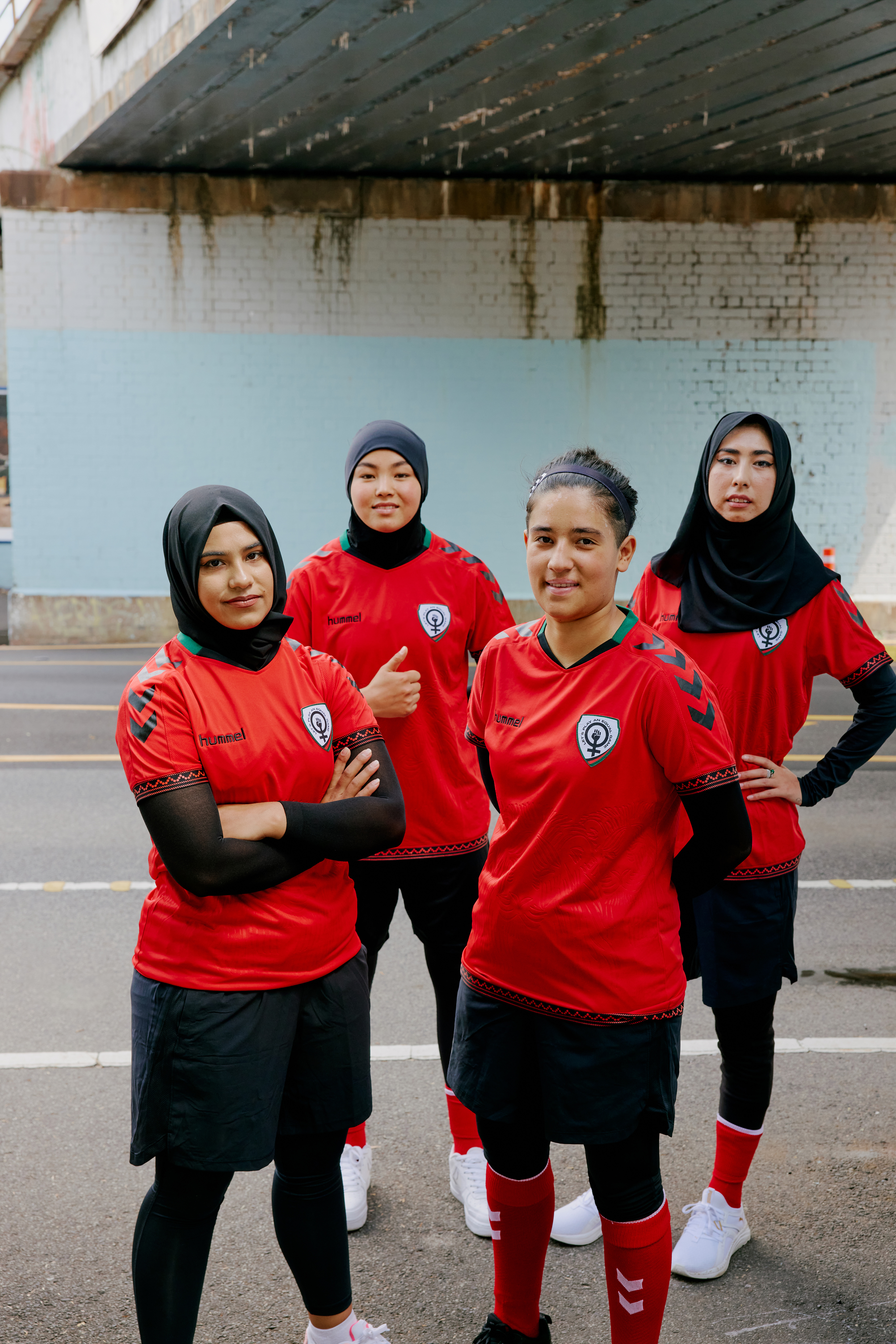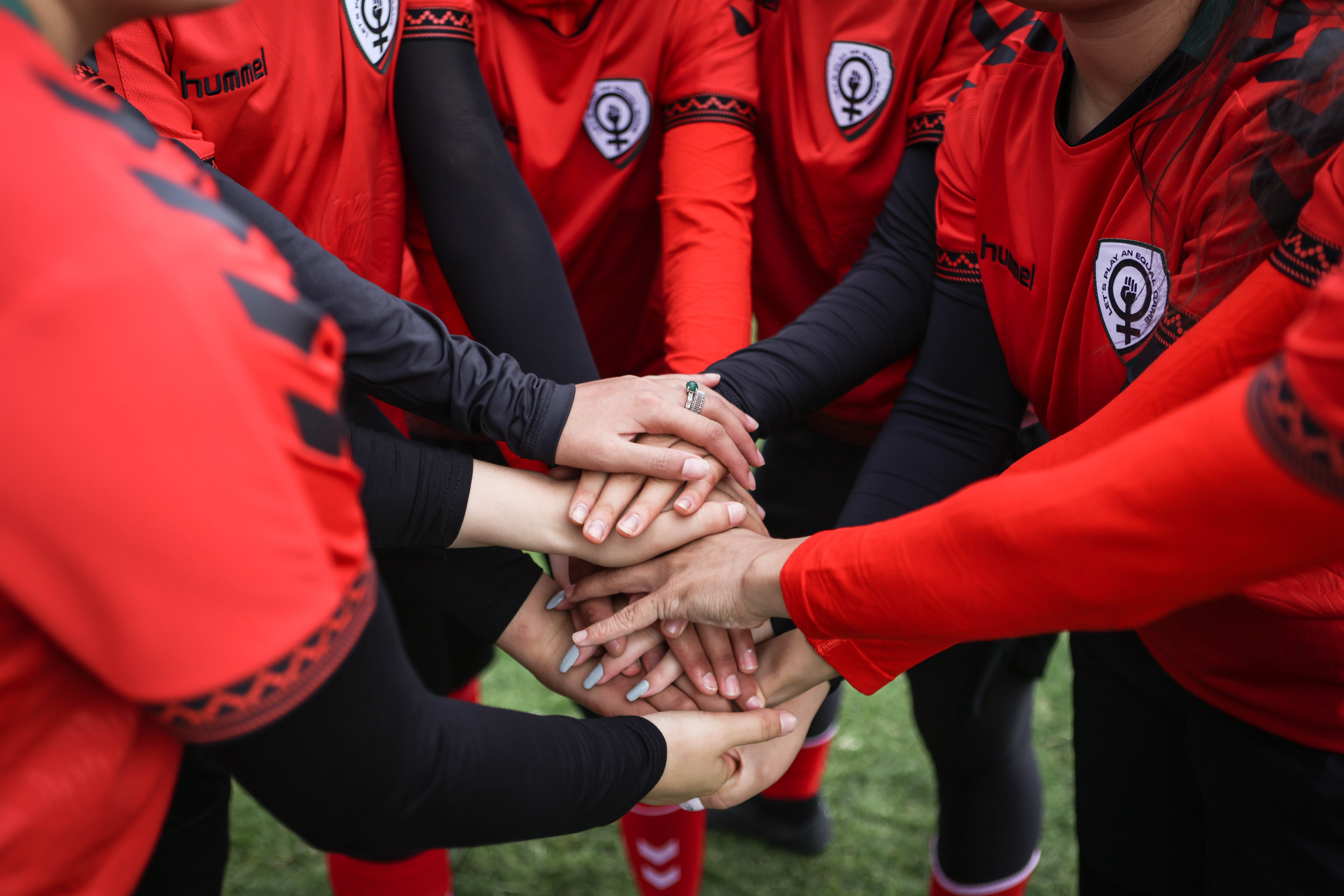When FIFA convenes its 72nd Congress in Doha, Qatar, on March 31, 2022, in preparation for the World Cup, journalists, football associations, fans, and others should press both FIFA officials and Qatari authorities about human rights in the Gulf state, particularly the rights of migrant workers, women, and lesbian, gay, bisexual, and transgender (LGBT) people.
Since 2010, human rights organizations, trade unions, and media have consistently documented the rampant human rights abuses in the country, especially against migrant workers, including widespread wage theft, high recruitment fees, unexplained deaths, and passport confiscation, among others. While Qatar has introduced several reforms with much fanfare, they came too late, have proven to be woefully inadequate, and are poorly enforced. Similarly, the authorities have made no serious reforms to the severe discrimination in law and practice against women and LGBT people.
Here are 10 important questions to ask:
- Why does FIFA continue to praise Qatar’s reform process despite the ongoing human rights violations in Qatar?
- Why are migrant workers in Qatar still not being paid despite announced labor reforms?
- Why has the Qatari government not published official statistics on the total number of migrant deaths disaggregated by nationality, sector, and cause, among others?
- Do FIFA and Qatari authorities have any plans to compensate the families of the migrant workers who have died inexplicably in Qatar to make the World Cup possible?
- How do Qatari authorities and FIFA plan to protect migrant workers in Qatar, especially construction workers, whose work might be temporarily affected during the tournament period?
- What will Qatari authorities and FIFA do to monitor and hold people accountable for abuses of service sector workers?
- What is FIFA doing to ensure that migrant workers have the same freedom as all other World Cup visitors during the game, such as watching the games and mingling with visitors?
- What steps has FIFA taken to ensure that Qatar is upholding women’s rights?
- What steps has FIFA taken to protect the rights of LGBT residents in Qatar?
- Will journalists face any restrictions reporting in Qatar if they come for the World Cup?
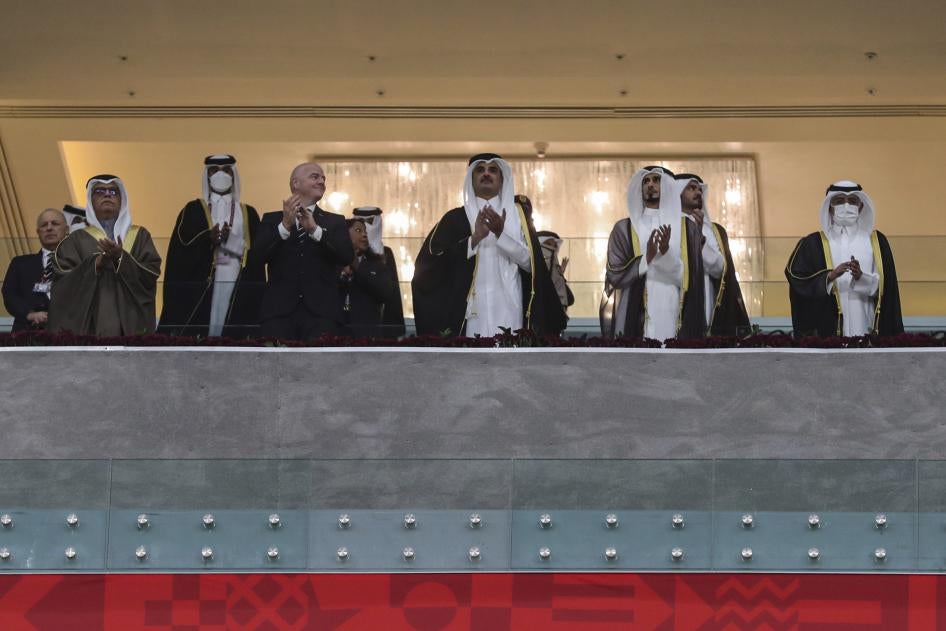
Despite repeated warnings and concrete evidence of rights violations, FIFA has not used its leverage or authority to pressure Qatar to follow through on its reform promises. Instead, FIFA has covered up for Qatar’s slow progress and championed the authorities’ reform narrative built around worker welfare that clearly does not reflect the reality for migrant workers.
FIFA has also failed to effectively push back on other repressive laws on press freedom, LGBT rights, and women’s rights. Not only has FIFA been a dismal steward for protecting and promoting human rights in Qatar, failing to use its leverage to truly push for football as a “force for good,” but it has also failed to fulfill its own human rights obligations under the United Nations Guiding Principles on Business and Human Rights (the Guiding Principles) that were adopted in 2016. As per the Guiding Principles, FIFA should step up and make reparations to the thousands of migrant workers or their families who experienced abuses, including unexplained deaths, to make the World Cup 2022 possible.
The FIFA decision to award Qatar with hosting the 2022 World Cup has been itself mired in controversy, starting with US Department of Justice allegations that FIFA officials were bribed to award Qatar the 2022 World Cup. FIFA made the decision despite the country’s poor human rights record and its massive infrastructure deficit, knowing it would rest on vulnerable migrant workers to build.
In March 2022, Human Rights Watch reported that workers at Bin Omran Trading and Contracting (BOTC), a prominent Qatari trading and construction firm, had not received their salaries for up to five months. BOTC’s projects include landscaping and underground utility works for Al Bayt Stadium, where the opening match will be held.
Indeed, Human Rights Watch research reveals that wage theft remains a systemic failure in Qatar with many employers getting away with it. Workers are still forced to pay exorbitant recruitment fees to secure jobs in Qatar, between US$700 and $2,600. This means they are already in debt before they arrive in Qatar, making them vulnerable to abuse and debt bondage.
Companies often withhold contractually guaranteed overtime payments and end-of-service benefits, and they regularly violate their contracts with migrant workers with impunity. In the worst cases, workers said, employers have simply stopped paying their wages, and the workers have often struggled to buy food.
Such abuses persist despite several reforms that Qatar has introduced since 2015 to improve wage protection for migrant workers. The government’s Wage Protection System (WPS), designed to ensure that workers receive their salaries through direct bank transfer by the seventh day of every month, allows the government to monitor wage payments and to impose sanctions on employers for noncompliance.
The Worker’s Support and Insurance Fund, which became fully operational in 2020, was established specifically to ensure that workers are paid wages they are owed when companies fail to pay or go out of business.
However, Human Rights Watch found that the Wage Protection System does little to protect wages and can be better described as a wage monitoring system with significant gaps in its oversight capacity. The authorities have yet to fully dismantle the causes for wage theft, which lie with the kafala (sponsorship) system; deceptive recruitment practices including high recruitment fees; and business practices including the so-called “pay when paid” clause, which allows the subcontractor to delay payments to workers until the subcontractor is paid and leaves migrant workers vulnerable to payment delays in supply chain hierarchies.
Had Qatar addressed the real causes of wage theft and had its announced reforms been well enforced, the WPS would have flagged companies like BOTC, which would have faced sanction, while workers would have been paid in a timely manner using the Workers Support and Insurance Fund. Instead, unpaid workers have been protesting collectively despite the risks, given that Qatar prohibits worker strikes.
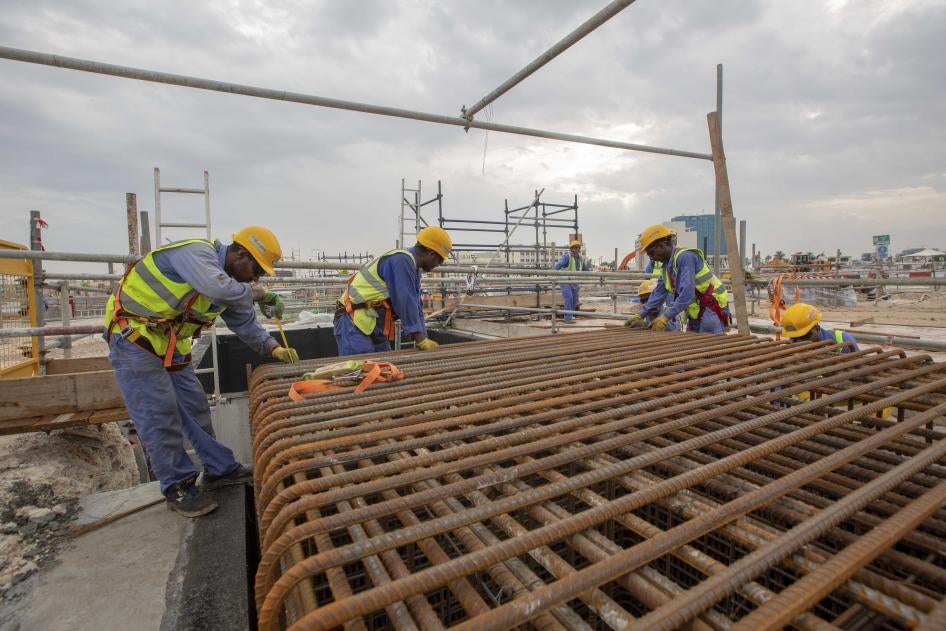
One of the most prominent rights issues since Qatar was awarded the World Cup hosting rights in 2010 is the unexplained deaths of thousands of migrant workers.
Despite the global attention and consistent pressure on Qatari authorities for transparency, they have failed to publicize sufficient data on worker deaths. The numbers in the public discourse therefore vary widely. Qatari authorities say that the number of non-Qatari deaths between 2010 and 2019 is 15,021 for all ages, occupations, and causes. But because the data is neither disaggregated nor comprehensive, it is difficult to do any meaningful analysis on migrant worker deaths.
A Guardian investigation shows that between 2010 to 2020, there were over 6,751 deaths in Qatar of people from just five South Asian countries, which were neither categorized by occupation nor place of work. According to a recently commissioned report by the International Labour Organization (ILO), there were 50 work-related deaths in Qatar in 2020, and these have been disaggregated by key characteristics such as places of injury and death and the underlying cause where available.
Despite the widespread criticism, the authorities have dragged their feet in making comprehensive data on deaths of migrant workers publicly available. FIFA, too, has not used its leverage to push for more transparency around migrant deaths, but instead made erroneous remarks about them. According to media reports, FIFA President Gianni Infantino has even suggested that there have been just three work-related deaths in FIFA stadiums in Qatar, an incredible claim that is lower than even what Qatari authorities have announced.
According to the Guardian investigation, 69 percent of the deaths of migrant workers from India, Nepal, and Bangladesh between 2010 and 2020 were attributed to “natural causes.” A fifth of the 50 work-related deaths from 2020 were attributed to “unknown causes,” the ILO reported. According to Qatar’s Supreme Committee’s Workers’ Welfare progress reports, 18 of the 33 fatalities recorded between October 2015 and October 2019 attribute the cause of death to “natural causes,” “cardiac arrest,” or “acute respiratory failure,” terms that obscure the underlying cause of deaths, such as heat stress, and make it impossible to determine whether they may be related to working conditions.
When deaths are attributed to “natural causes” and categorized as non-work-related, Qatar’s labor law denies families compensation, leaving many of them destitute in the absence of their often-sole income provider. For a country with a highly advanced healthcare system, it is unfathomable that transparent data on worker deaths is not available and meaningful investigations of deaths have not been conducted but are simply attributed to “unknown” or “natural causes.” This does not prevent future deaths nor provide any consolation to the grieving families who are left in the dark.
Under the United Nations Guiding Principles on Business and Human Rights, FIFA too has the responsibility to provide reparations for abuses it caused or contributed to. As an entity that has immense resources, it has no excuse not to fulfill its obligations. In 2014, for example, the qualifying rounds and final tournament brought FIFA US$4.6 billion, with profits amounting to over $2 billion.
National football associations, which can be tarnished by association with rights abuses, also have leverage over FIFA that they can and should use. No player would want to be a complacent participant in a tournament that has caused such immense loss of migrant workers’ lives and livelihoods. It is encouraging that many national associations have started speaking up on the issue and should continue to push for tangible commitments including reparations to those who were subject to wage theft and to families who lost loved ones. This would ensure that thousands of families of migrants who lost their lives in Qatar while making the games possible are not left with nothing.
Human Rights Watch has obtained a circular from Qatar’s Public Works Authorities requesting companies to reduce their migrant labor workforce from September 21, 2022 to January 18, 2023. As per the circular, “All Contractors shall prepare a strategic plan for workers’ leave which maximizes the reduction in the number of workers in the country during the period. It should not adversely impact the migrant worker’s well-being and established RPD [Roads Project Department] projects’ targets and objectives.” According to Migrant Rights, construction companies – primarily subcontractors – also shared that the directive has been communicated to them informally.
This policy should avoid adverse effects on migrant workers’ rights, including unfair dismissal and wage theft through denial of paid leave, end-of-service payments, and severance pay. Workers should be paid for any leave time that they are compelled to take and all wages and other benefits should be paid to them before they take such leave.
Migrant workers hired for jobs in Qatar do not have the luxury to take unpaid leave for extended periods. A large majority of workers, especially the recently hired ones, have outstanding loans associated with their illegally imposed recruitment fees that will continue to pile up during the months they are back home if they are not paid. The wages in Qatar are also how workers and their families make ends meet on a paycheck-to-paycheck basis without any savings or support system to draw from. Workers who face early dismissal or whose contracts will not be renewed should be allowed time to find another employer in the country. All such workers should be paid all their outstanding payments due, including for any untaken vacation time, wages, overtime pay, end-of-service payments, and any severance pay.
It is important for Qatari authorities and companies to clearly communicate to workers the details of the arrangement, with strong systems in place to ensure that companies do not take undue advantage of the situation to cheat workers.
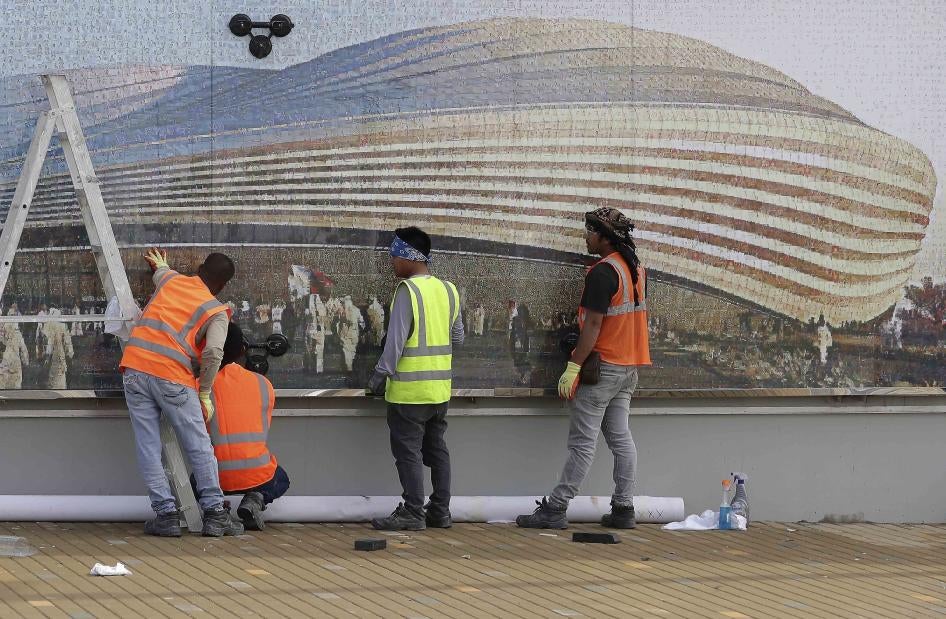
Just as the construction phase of the World Cup has rested almost entirely on the backs of migrant workers, who comprise over 95 percent of the Qatari workforce, the delivery of the World Cup will also be almost entirely dependent on migrant workers. They will serve players, fans, and other visitors as waiters, hotel workers, shop staff, housekeepers, stadium workers, security guards, and drivers. Recent evidence has shown that hotel workers and security guards have continued to pay high recruitment fees. Every worker that a fan or a player comes across could, therefore, potentially be a victim of some form of abuse, such as paying exorbitantly for the jobs.
The Worker Welfare Standards from the Supreme Committee for Delivery and Legacy, Qatar’s 2022 FIFA World Cup organizer, were originally developed for the construction sector, but have been extended to the hospitality sector. Stakeholders have come together to develop a guidance tool for fair recruitment and employment for the hospitality sector in Qatar that hotels are expected to follow.
Proper due diligence by national football associations is key to ensuring that they do not contribute to or are associated with the abuses. However, it is also important for news media to be aware that they should not have a narrow focus when covering how migrant workers are treated. Just as some coverage has focused on stadium workers who comprised only 1.5 percent of the migrant workforce, media focus should not be limited to service workers in companies serving elite visitors like players and coaches. Conditions for workers serving elite visitors will undoubtedly be under disproportionately higher scrutiny and standards, but they will be a tiny proportion of the total service sector workforce that will directly or indirectly cater to the 1.2 million visitors expected to visit Qatar for the tournament.
Migrant workers in Qatar are part of the estimated 3 billion viewers of the World Cup who, in addition, also were indispensable in making the World Cup in Qatar possible. A good illustration of the popularity of the game among migrant workers in Qatar is captured in the documentary The Worker’s Cup.
Now that fans are flocking in from all over the world, migrant workers’ freedom of movement should be respected. They should not be restricted to parts of the country or in cramped labor camps or worse, sent back to their home countries, out of the sight of visitors who would otherwise be appalled if they got a glimpse of their living conditions.
Football is often called “the beautiful game,” which means there should be no discrimination among fans, whether they are low-paid workers who built and serviced the stadiums and infrastructure for the World Cup or visitors who bought the most expensive tickets and flew in from afar. Migrant workers and visitors should be allowed to mingle with each other. Visitors, including journalists wanting to report on the migrant worker situation, fans, and stakeholders like national football associations, sponsors, and rights organizations should not be restricted from visiting labor camps.

Qatari authorities require women to obtain permission from their male guardians to marry, study abroad on government scholarships, work in many government jobs, travel abroad until certain ages, and receive some forms of reproductive health care. Some hotels require women to have a male guardian or be married to book and stay in a hotel room. Some events, such as concerts where alcohol is served, even ban Qatari women from attending. Such policies are discriminatory and facilitate violence against women.
Qatar moreover, has no domestic violence law and women who attempt to flee abuse can be returned to abusive families, arrested, or sent to psychiatric hospitals. A lack of transparency over discriminatory rules makes it difficult for women to challenge them. Women in Qatar have appealed to the authorities to repeal such laws. However, repressive laws limiting freedom of expression and association, government intimidation, and online harassment prevent women from challenging such rules or punish them when they do. There are no independent women’s rights organizations.
The authorities have made no serious reforms to the severe discrimination in law and practice they impose against women, affecting Qatari women and the many foreign women who live in the country. The authorities should eliminate all discriminatory male guardianship rules and practices, pass anti-discrimination law to end discrimination in practice, and repeal laws and practices that limit women’s civic participation to demand their own rights.
Qatari authorities criminalize extramarital sex, which disproportionately affects women, who can be prosecuted if they report rape and because pregnancy serves as evidence of the so-called crime. The penalties for these offenses are some of the harshest in the region, with up to seven years in prison, and floggings if they are Muslim. Police often do not believe women who report violence. Women are also required to show a marriage certificate to access certain forms of sexual and reproductive healthcare.
At major sporting events like the World Cup, the risk of sexual violence increases greatly, not just for fans, but particularly for migrant women in low-paid sectors. A Mexican woman who was a Supreme Committee official reported a physical assault by a man to the police in Qatar in June 2021. Instead of getting protection and justice, she found herself accused of the so-called crime of extramarital sex because the man claimed to be in a relationship with her, which she denied. Even though she managed to leave the country, the authorities proceeded to prosecute her on this charge and she remains on trial. Qatar should repeal legal provisions criminalizing extramarital sex, including article 281 of the Penal Code. The authorities should ensure support for survivors of sexual violence including medical, legal, and psychosocial – mental health assistance, and including emergency contraception, sexual health checks, and post-exposure prophylaxis for HIV. The authorities should allow all women access to sexual and reproductive health care without requiring a marriage certificate and should ensure that police and prosecutors have gender-responsive training.
Qatar has assured prospective visitors that it will welcome lesbian, gay, bisexual, and transgender (LGBT) visitors and that fans will be free to fly the rainbow flag at the games. However, prospective visitors including LGBT fans have been deterred from attending the games, as shared by the English Football Association Manager, Gareth Southgate based on his discussion with English fans.
People who have experienced government repression have told Human Rights Watch that the Qatari government surveils and arrests LGBT people based on their online activity. The authorities also censor traditional media related to sexual orientation and gender identity, including people who show support for LGBT individuals. They have effectively excluded LGBT content from the public sphere.
Suggestions that Qatar should temporarily suspend domestic laws and state practices during the games would reinforce the idea that same-sex desire and gender variance are a peculiar preoccupation of outsiders. That leaves LGBT residents of Qatar struggling to navigate their sexuality and gender identity in a repressive environment that risks resuming in full after the World Cup.
As Qatar advances its surveillance capabilities, including inside football stadiums, the possibility of LGBT Qataris being persecuted for publicly supporting LGBT rights will remain long after the international fans leave. Physical and virtual spaces free from surveillance are vanishing in Qatar as its data protection law allows broad exemptions that undermine the right to privacy. Digital targeting is combined with laws that target people based on consensual sexual conduct outside of marriage.
Long-term legal reform should prioritize the realities of LGBT residents of Qatar, including by introducing legislation that protects against discrimination on the basis of sexual orientation and gender identity, online and offline. The Qatari government should repeal article 285 and all other laws that criminalize consensual sexual relations outside of marriage.
Press freedom is curtailed in Qatar, which ranked 128 on the World Press Freedom list for 2021. Qatar also introduced an amendment to its penal code that imposes up to five years of prison for spreading rumors or false news with ill intent. It is not clear who determines what is a “rumor” or “fake news,” and what standards they will use in making such a determination.
In November 2021, two Norwegian journalists investigating migrant worker issues in Qatar were arrested and detained for 36 hours. Film showing evidence of the migrant worker situation in Qatar was destroyed. Separately, the same month, another Norwegian journalist was also held in solitary confinement for 24 hours. Such cases are common in Qatar, posing a credible threat to the narrative that the country is trying to build through its heavy public relations machinery.
Similarly, migrant workers who speak up about their realities and become important sources of information are also at great risk of immediate and arbitrary detention or deportation. Over the last year alone, Qatari authorities forcibly disappeared the Kenyan labor activist Malcolm Bidali before releasing him, and put Abdullah Ibhais, a Jordanian former employee of the Supreme Committee, on trial for bribery and misuse of funds, which some evidence suggests was in retaliation for his criticism of the poor conditions for migrant workers.
Qatar should have had every expectation of massive global media interest and coverage over the decade leading up to the World Cup and in the year of the tournament. It should not come as a surprise to Qatari authorities or FIFA that journalists who come to Qatar during the tournament will be interested in stories beyond the matches and who scores goals. They should be ensured that they will be safe and allowed to do their work with little interference. They should face no undue restrictions to report on social or economic issues should they wish to do so. Similarly, fans and other supporters should also not face any safety concerns for posting openly on social media platforms.
If Qatar and FIFA do indeed believe their own reform narrative, they should see the arrival of thousands of journalists and commentators from all over the world to the country as an important opportunity to bear witness to the positive transformation, not restrict their access or suppress their voices.
